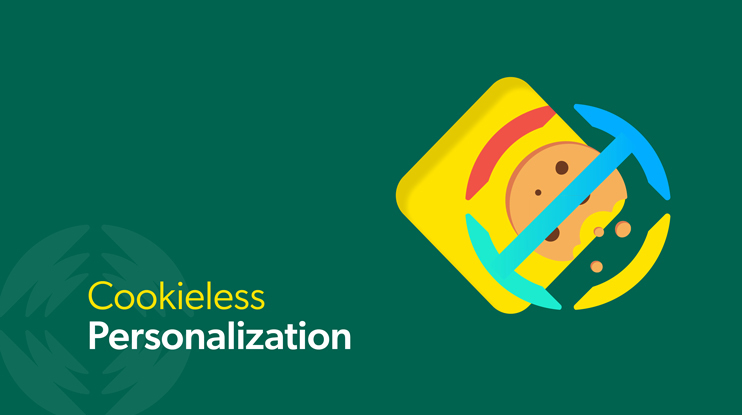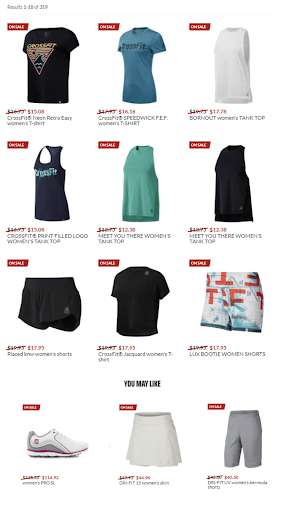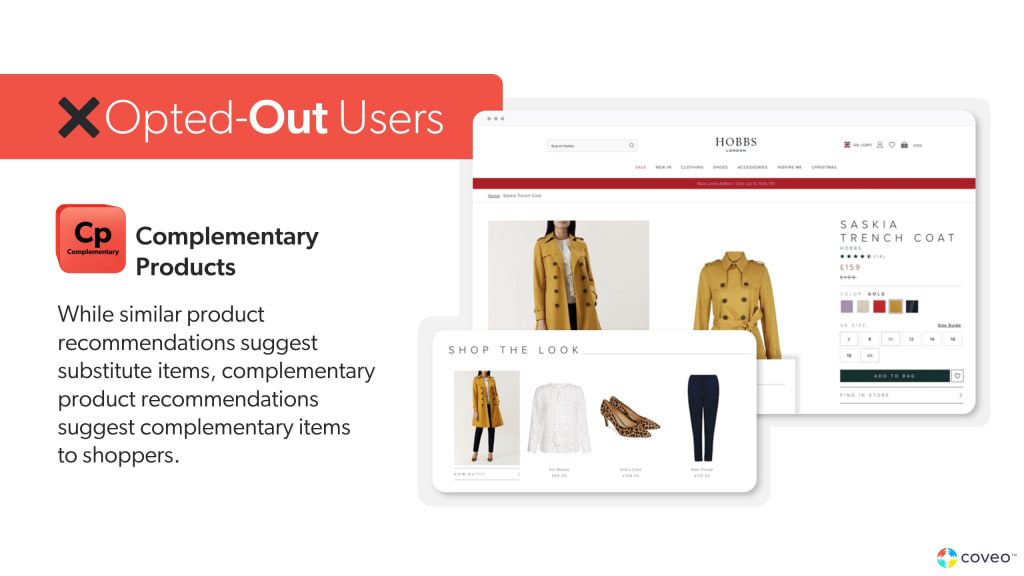With third party cookies disappearing, cookieless personalization and cookieless advertising vendors are surfacing. But is that what you really need?
When it comes to choosing a product and vendor that can recommend relevant content to your site visitors, evaluating the solutions available on the market can be a challenge.
There’s no debate that, when properly done, ecommerce recommendations are key to successful customer experiences. Relevant recommendations and targeted ads mean that customers can easily find the right products. Unfortunately, it has become increasingly hard for brands to differentiate between recommendation vendors as they all seem to promise the exact same capabilities.
To stand out from the crowd, some vendors have started to claim that they are “cookieless” and that they are ready for the future of the internet in a cookieless world. While the promise of cookieless technology that doesn’t track customer data seems to be intriguing, let’s look closer.
The reality is that these vendors are defining themselves by a negative… but why? The notion of a product made for a cookieless future is a sign that the product doesn’t have real means of personalization. So the question becomes, is it possible to have both personalization and user privacy-conscious technology?
In this article, we explain why it is neither wise (nor necessary) to throw the baby (personalized recommendations) out with the bathwater (cross-site tracking and 3rd party cookies).
But first, a quick review.
What Are Cookies and How Do They Work?
It’s important to understand how cookies were intended to work, and how the internet runs on consumer data.
When a person visits a site, a third party (not the visited site) leaves a cookie, which is a small piece of code, on that person’s browser. These ‘cookies’ identify that user’s browsing data across multiple websites, enabling the tracking of user behavior across the web. This consumer data, or third party data, is collected and sold to help retailers and other businesses track visitors, personalize experiences, and analyze performance.
3rd party cookies have played an enormous role over the last 10-15 years in providing shoppers with recommendations and targeted advertising in tune with what they are searching for. They act as your personal concierge knowing everything about you and your preferences – and can alert the next site you visit that you are interested in, say, gold kitchen sink faucets.
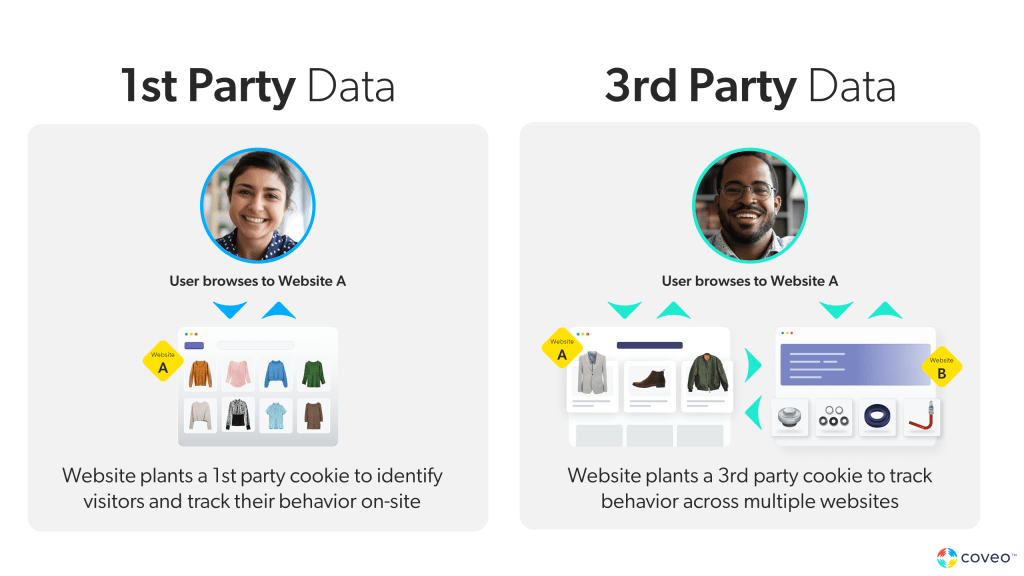
First party cookies, on the other hand, generate first party data. This data is site-specific and remembers the user allowing them to navigate a site without having to log in every time they go to a new page. This data contains very detailed records of what a visitor does when navigating an individual website or online store. A big difference is that it also requires asking customer permission to access and use their personal data.
Initially, consumers liked the advantages of a personalized experience that cookies were able to deliver. But as marketers started to push cookies into every portion of our online life — marketing got so specific it was creepy.
Customer data collection transparency and data privacy practices soon became a priority and eventually, laws were implemented to constrain tracking practices. Ultimately, third party cookies were put on the chopping block. This is whyGoogle is now phasing out third party cookies completely by the end of 2024. In addition, other browsers are now blocking third party cookie creation or ensuring they are deleted in a set number of days.
To demonstrate compliance with the new future of consumer privacy, vendors have started to brag about how they are “going cookieless!” and that there’s nothing to worry about. Now, this addresses privacy concerns which sounds great, but we can’t forget, cookies are what allow for personalize recommendations and a more relevant customer experience.
‘Cookieless’ Puts Positive Spin on ‘Non-Personalized’
Since May 2018 when GDPR went into effect (and then 2020 with California’s CCPA – California Consumer Privacy Act) sites have had to explicitly ask visitors permission to collect personal data from them.
And this is why the whole cookieless thing became the new hot feature for recommendation vendors.
But what does cookieless really mean and how is it affecting recommendations?
It just seems like an attempt to distract from the true cost of non-personalized recommendations to cast them in a more favorable light.
In reality, when you get rid of cookie tracking and lose cookies altogether— you also lose a personalized user experience.
The Cost of Non-Personalized Recommendations
Consulting firm McKinsey estimated that 35% of what consumers purchase on Amazon and 75% of what they watch on Netflix comes from personalized product recommendations. Indeed, Amazon and Netflix have a unique ability to engage with each of their customers on a personal level.
This can actually be done in compliance with privacy laws. If a shopper’s browsing behavior is collected by the company that owns that site — not sold to a third party — and used by the company’s recommendation engine, it’s only a first party cookie! This is a completely legal and user privacy-conscious way to collect user data as these types of cookies must be approved for use by the visitor.
That’s why “going cookieless” is truly throwing the personalization baby out with the cross-site tracking bathwater. Instead, companies need to find vendors that are ready to comply with privacy regulations and handle future technological developments without giving up on personalization.
To this end, make sure the vendor you choose offers appropriate tools for first- and zero-party data collection and a complete suite of recommendations strategies that include models for personalization. Settling for cookieless tracking and cookieless recommendations means giving up on opportunities to generate more revenue and profit through personalization all while improving the customer experience.
The Rise of First-Party and Zero-Party Data
Beyond first party data, there is another type of data: Zero party data.
This is a specific type of data that a shopper intentionally and proactively shares with a company or site. It can be the result of filling out a survey, answering questions, completing a profile, or any other information the individual freely and consciously gives to you to recognize them.
Both of these types of data are likely to play a critical role in personalizing experiences for your visitors.
While we’re talking about the rise of first party data, it’s important to note that there are some who believe that the removal of third party cookies will just be the first step toward removing all cookies. Yes, this is being discussed and proposals are being considered. However, it is far from clear what the alternative should and would look like — and whether these alternatives would actually improve privacy protection.
In fact, the very notion of “privacy” means different things to different people and even different organizations, making these disputes especially hard to settle. Since there is no consensus in the industry with regard to privacy-conscious alternatives to first party cookies, it is safe to assume that, at least for the foreseeable future, these necessary cookies are here to stay.
Either way, Coveo watches this space carefully and will respond accordingly, if or when the regulations change.
First Party Personalization vs Third Party Cookieless
Using the phrase “cookieless” has been a means of some vendors saying they are in compliance — while hiding that their products and software can no longer personalize the user experience.
At Coveo we don’t like to say cookieless because we know we can still leverage both first- and zero-party data that customers have given permission to be used. With that data, and powerful machine learning algorithms, we can offer a highly personalized experience while staying compliant and prioritizing privacy.
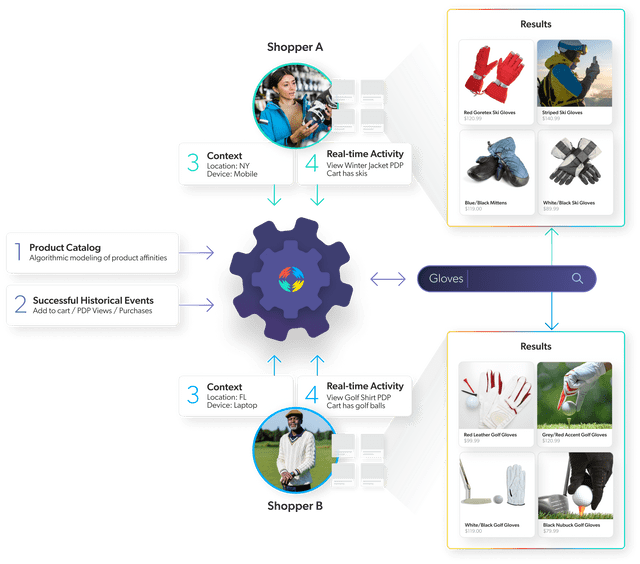
It’s important to note that when a user doesn’t accept first party cookies when they visit a site, there are some drawbacks. In those cases, it is not possible to track the impact of recommendations for those visitors (e.g. if they clicked or went on to buy).
However, even when visitors don’t wish to be tracked on a website, it is possible and, in fact, imperative that the recommendations shoppers receive are always relevant.
Session-Based Recommendations
One example of a recommendations method that uses first party data instead of third-party but still delivers powerful, privacy-conscious personalization, is so-called session-based recommendations.
These personalized recommendations work by understanding visitor intent based on interactions observed in an ongoing visitor browser session and analyzing the search and browsing behavior in real time.
This session-based data can successfully tailor the customer experience to their interests — making them more likely to buy.
For example, imagine I’ve searched for some golf pants on an ecommerce website, which I’ve promptly added to my cart. Session-based recommendations may start showing me with golf-related items automatically.
This is a key feature and a game-changer that helps ecommerce players deliver personalized shopping experiences without the need for high volumes of data or logged-in users.
These session-based recommendations must remain relevant throughout the visitor’s session by also detecting intent changes and adjusting accordingly. For instance, you wouldn’t want to keep seeing golf accessories once you start shopping for your next tennis outfit. Simply put, any form of personalization that looks at user behavior is dependent on cookies or similar technologies because people must be identified.
Innovative vendors that deliver privacy-conscious recommendations tend to leverage zero-party data and clickstream data for in-session personalization.
It is to this end that Coveo has developed cutting-edge technology and provided “Personalization as you go ,” using shoppers’ behavior signals to tailor and improve the customer experience in real time
What to Do When First Party Data Is Unavailable?
So what do you do when site visitors won’t click “accept” to collecting first party data at all?
First of all, only a low percentage of people actually block first party cookies. By rejecting them they are telling you they have no expectation of personalization. Second, when first party data is not an option, then you have to make do with product and content recommendations.
Any model that is based on global data (popular products, trending products, new products) or that is based on product-to-product relationships (complementary products or similar products) can still function without cookies and personalization.
While not as effective as personalized recommendations, cookieless recommendations can be used to showcase the most popular products of your store. These recommendations can help new shoppers save time, giving them access to some of the most valuable and potentially relevant products.
But, even these solutions come in two flavors – machine learning generated or not. Vendors that offer ML powering recommendations will have far greater relevancy than those that are simple rule-based. So even when first party cookies cannot be leveraged to deliver personalized experiences, it is critical that websites deliver experiences that are easy, effective and relevant.
Unfortunately, this is not the case on most ecommerce sites. For instance, we can see here that when a user is viewing a protective case for an iPhone 12, the recommendations received aren’t really that relevant, as they are for Samsung or iPhone 6.
So to combat that, you need a recommendations engine that offers robust machine learning that can identify complementary products – or have in place a large amount of manual rules that need to be continuously updated.
Privacy-Conscious Personalization
Rather than worry about finding a vendor that offers cookieless recommendations, we believe you should be looking for one that offers privacy-conscious personalization.
Don’t be surprised that few vendors are able to offer this – and the reality is that won’t change in the near future either. For example, Coveo has leveraged substantial amounts of funding, 15 years of machine learning experience, and the acquisition of a team of scientists and academics to be able to offer this mature personalization.
And because of this, Coveo is a best-in-class recommendation and personalization engine solution that provides the most relevant, personalized experiences when users accept first party cookies and even when they do not accept first party cookies. Because of its machine learning models, Coveo excels at delivering relevant recommendations with or without the necessary cookies.
Dig Deeper
Want to find out more about types of personalization elements ? Explore the Recommendations Periodic Table. Discover the 5 categories and 17 elements you can be using on your site, the types of data they consume and the KPIs that will be impacted!


